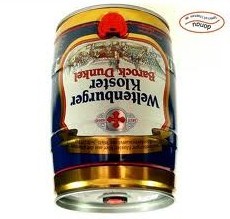Beer doesn't travel well.
American standards require pasteurization.
Alcohol content is lowered.
It is never fresh.
I guess there is something to all of that, but I am no expert.
As an aside, I ate at a German restaurant in Puerto Vallarta a few years back, the Cafe Frankfurt. The owner was German, and as I was enjoying a couple of good Paulaners, he told me that when beer is imported into Mexico, there are no mandated alterations, like pasteurization.
It does seem that the product in the US has been improved over the decades. That taste of formaldehyde is gone (or whatever it was). Yet, even when you go to those places like the Alpine Village or Old World Village in SoCal, the Bitburgers and the Warsteiners and the Spatens just don't measure up to the taste you experience in Germany.
In addition, I have always wondered; why doesn't an aspiring brewer replicate the conditions and the techniques in Germany? Seems to me one could make a fortune. You can use German barley and hops. Do you actually require German water?
But there is good news. If you make it to Las Vegas, you must visit the Hofbrauhaus (corner of Paradise and Harman near the airport). Affiliated with the Hofbrauhaus in Munich, they import the beer directly from Munich to Las Vegas in barrels. I have been to the one in Munich in the past few years, and I can assure you the taste is authentic. I understand there is another Hofbrauhaus in Kentucky outside Cincinnati. I have not been there.

Hofbrauhaus Las Vegas
http://www.hofbrauhauslasvegas.com/?gclid=CN6Jo7XM1LUCFQeznQodrmUA6w
And you will have a lot of fun there.
Here is the website for the one in Newport, Kentucky:
http://www.hofbrauhausnewport.com/
And the Hofbrau Beer Garten in Panama City, Florida.
http://www.hofbraupcb.com/
( I can only attest to the one in Vegas.)
The last time I was in Vegas I asked the manager how they manage to preserve the authentic taste. (That's why I asked the manager.) He wasn't sure, but he did tell me that when the beer is shipped, the kegs are turned upside down to allow the beer to "reblend".
Could that be the secret I have been searching for for nearly half a century?
Apparently, the changes mandated by law in the US are looser if the beer is in kegs. That's why those beers in 5-liter kegs are better than in bottles-if you can drink all 5 liters in one sitting. They get stale quickly. Recommended for parties.
Anyway, I still maintain that the Hofbrauhaus is the only source for true German beer in the US.





